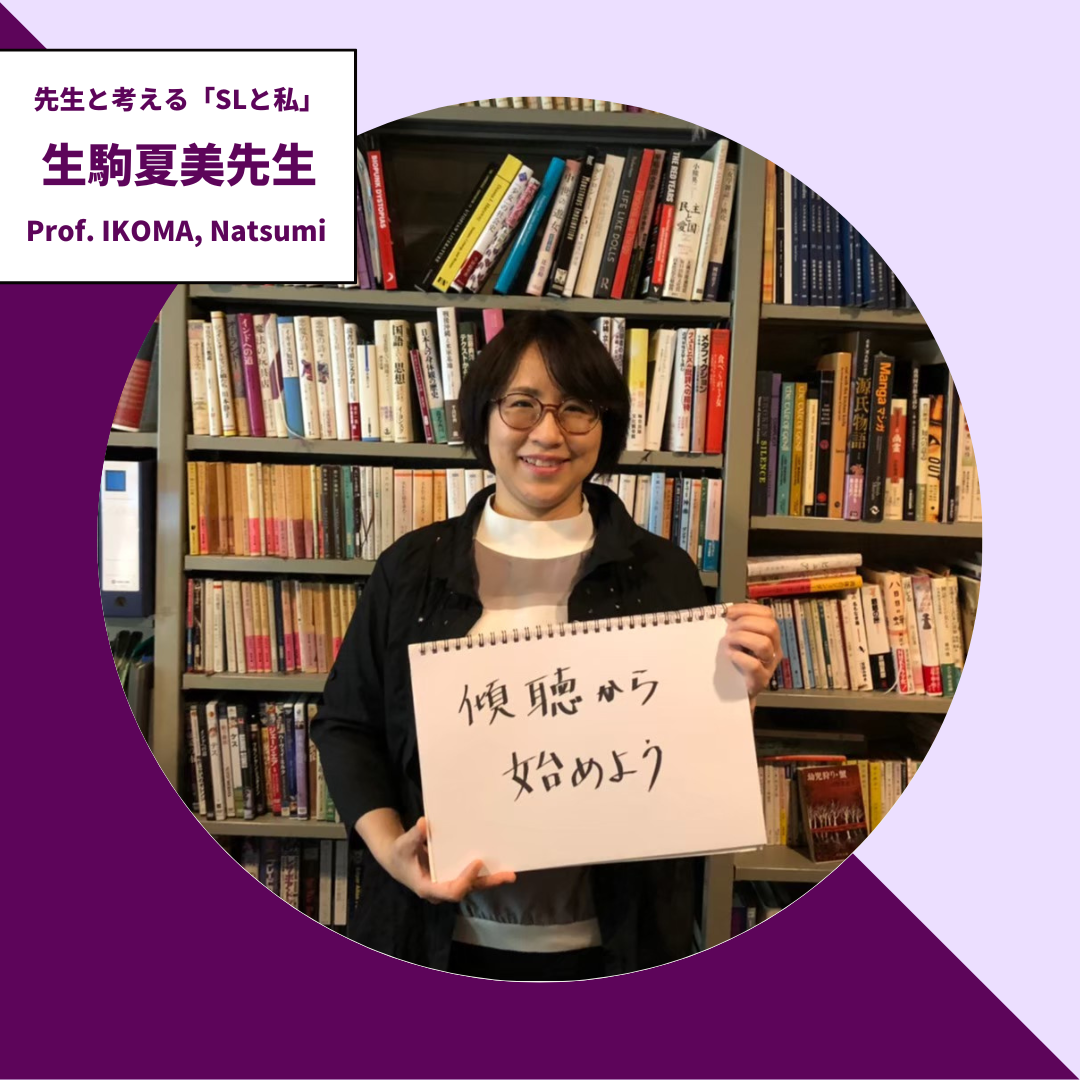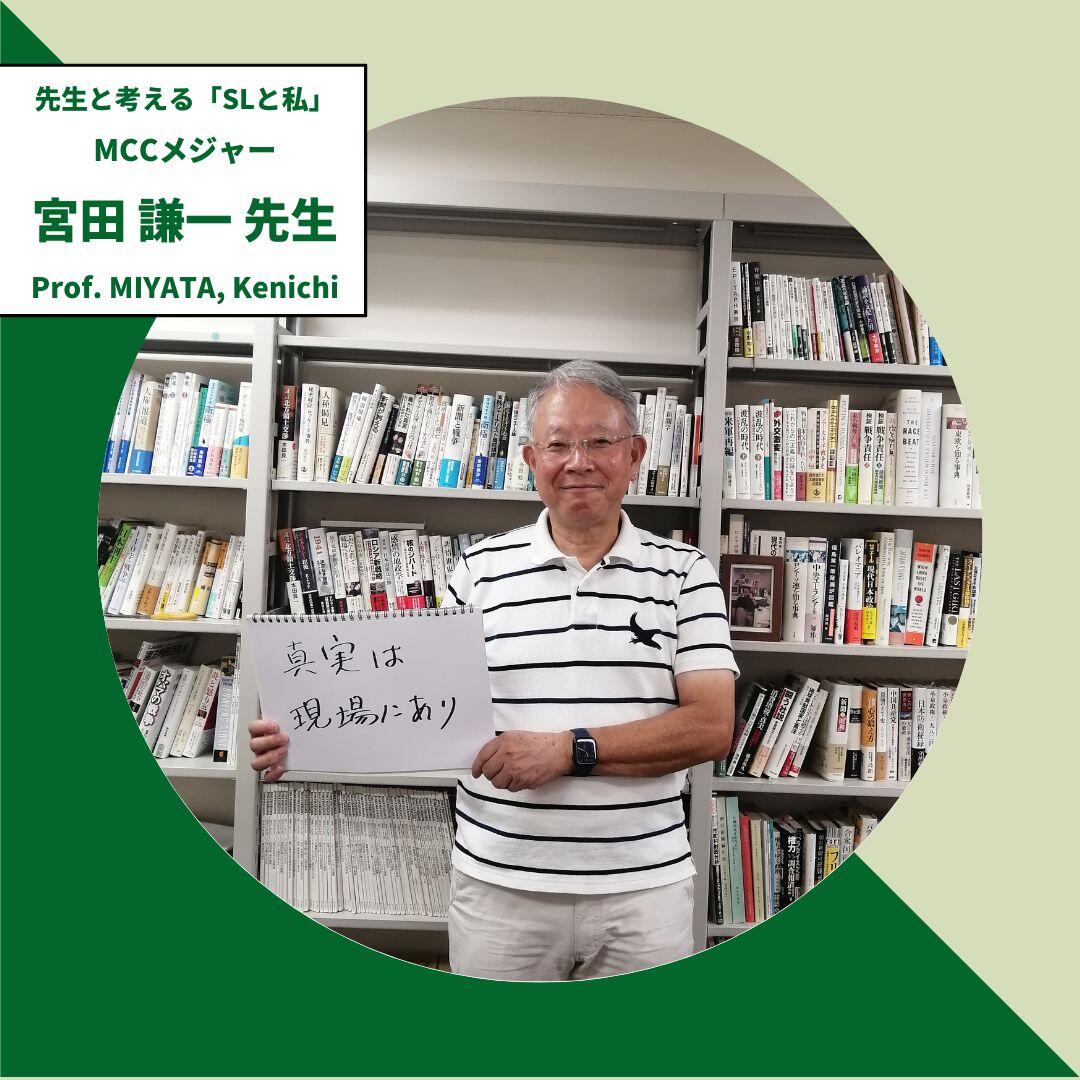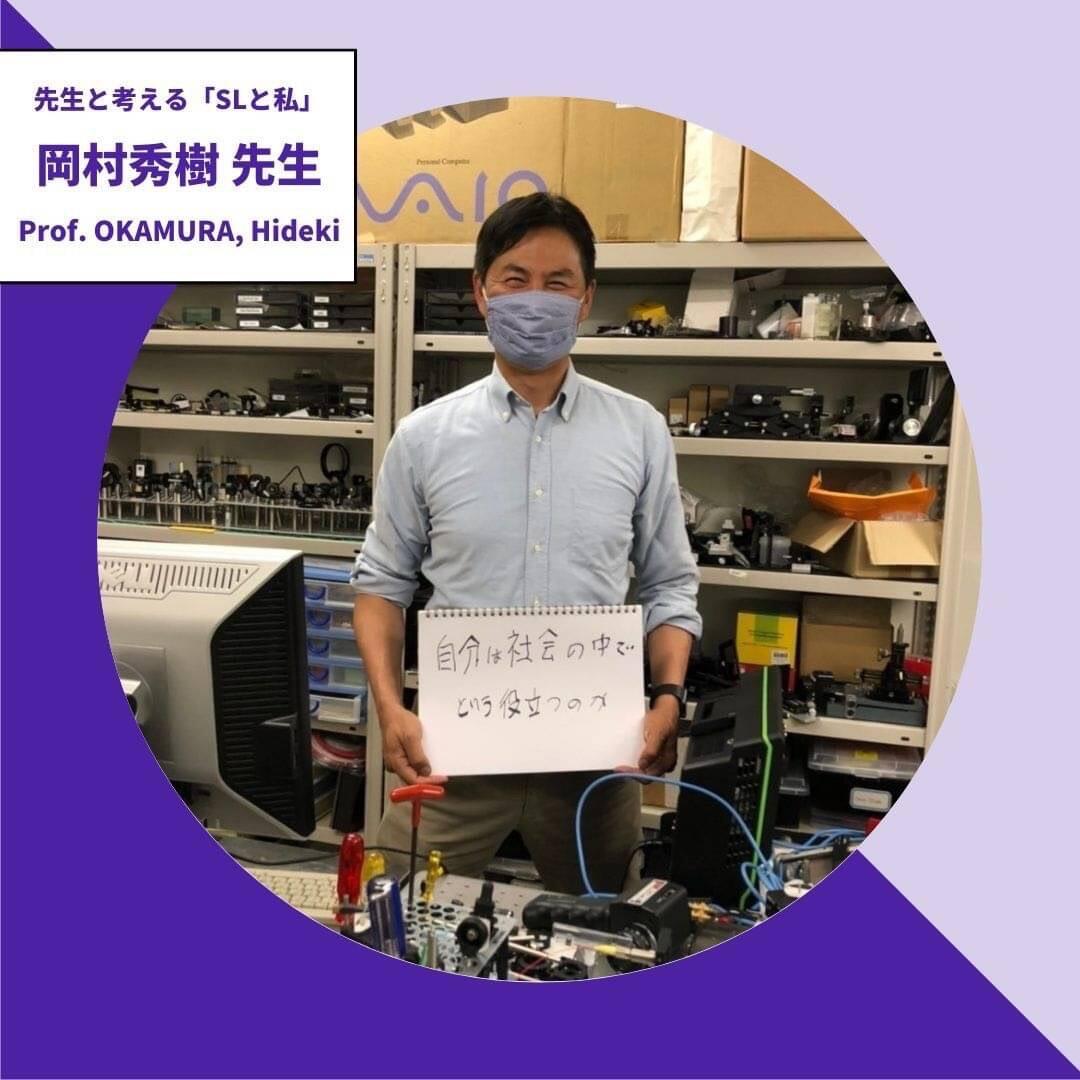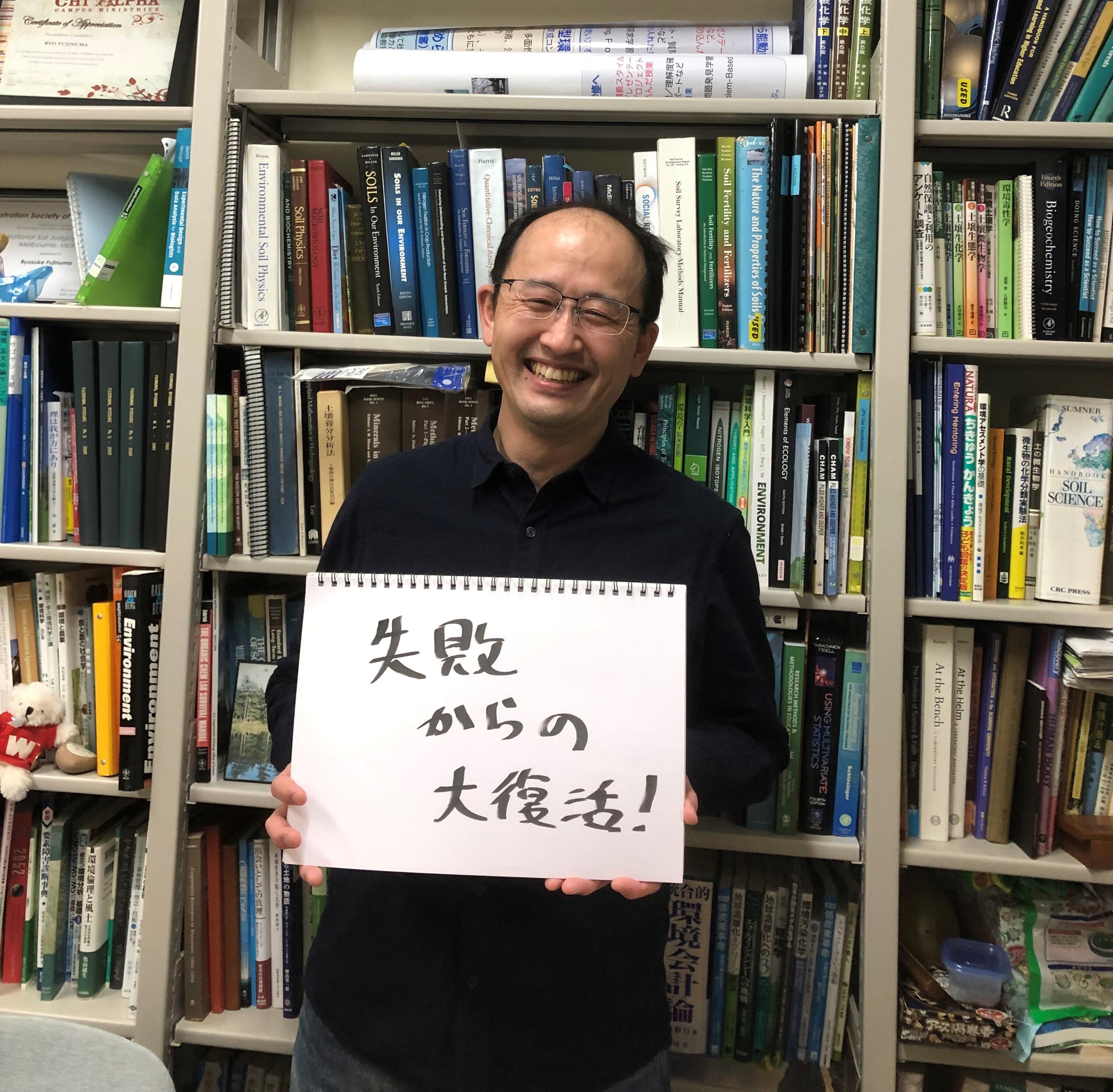Project
ICU's Major x Service-Learning
Hello, this is SL Ambassadors! In this project, we interview teachers about their own SL experiences and advice they can give students. To all of you who are wondering about majors or SL activities, please take a look!
Professor Natsumi Ikoma, Gender, European Literature

What is your research field and what attracts you to it?
My research is on how the body and gender are represented in literature in a field where gender and sexuality intersect. The fascination is that reading with the help of theory can bring to light the social norms and other factors behind the works written. I also find it interesting to be able to verbalize and introduce to the world the amazing ways in which recent women writers are using literature to subvert existing gender hierarchical structures.
What is your service activity experience?
When I was in junior high and high school, I volunteered at a nursing home, but I just did chatting and indoor games with them. However, the elderly people looked forward to it and thanked me for it, and that experience gave me a lot of courage and made me happy. I think that was my original experience of volunteering. I am often asked for my professional knowledge at the local government, which is my current volunteering activity.
How can you advise SL students?
I can tell students that just the fact that they come to learn with interest is an encouragement for the organization. I can also advise that students should listen to what the organization says and should be receptive and mindful about what they want students to do, and what students can do for them.
How do you think SL activities can be applied to your studies in your major?
I think the experience of involving in activity with others for SL is close to the attitude of "listening to others" in literature and gender sexuality studies. I believe that one of the main characteristics of SL is that one can acquire the attitude of "start thinking about what one can do by asking others.
Professor Kenichi Miyata, International relations, Politics (Media Studies, Journalism Studies)

What is your research field and what attracts you to it?
My academic field is media studies in the broadest sense or journalism studies in the narrowest sense. I study journalism based on my practical experience as a newspaper reporter. With students, I want to consider journalism's public interest role. I also want them to think about choosing and gathering the information they need from the wave of information caused by the expansion of the digital world. I believe that if they can learn about the public interest role that media and journalism play in logically working out the media view that each of them has, their future information life will be enriched.
How can you advise SL students?
The content varies depending on the student's theme. For example, last year, a student asked for advice regarding his/her "positionality" in activities, saying, "I want to avoid treating poor people from a superior position. At that time, I told them, "Services are not given to the poor by the rich. If we can see it as a way of giving back to those who are fortunate enough to have us and thanking them for allowing us to help them, there is no almsgiving in sight. If we are grateful for what we can do to help, we can get out of that positionality trap." You conveyed this to them. We also had many interviews during the stages of making presentations and scripts, and I believe we were able to have fruitful dialogues there.
How do you think SL activities can be applied to your studies in your major?
The best part of journalism is finding out the truth that is totally different from what they expected through meeting the people involved and hearing their stories or going to the field and seeing it for themselves. Even in service-learning, I want students to make discoveries by seeing the field. For example, someone who thought they were going to help the poor might realize by going to the field that they are not unhappy.
Professor Hiroshi Okawa, Philosophy of Education

What is your research field and what attracts you to it?
I am majoring in Philosophy of Education. When I was a junior high school student, I was surprised to read in the Fundamental Law of Education that "Education is aimed at the perfection of personality...". I wanted to know what kind of theories, philosophies, and ideas were behind this phrase, so I entered the Faculty of Education at university. I think the appeal of philosophy of education is that it allows us to pursue the question, "How can we become more human?"
What is your service activity experience?
In the past, I led an international exchange camp for junior college students. We visited a village in Sri Lanka where electricity had just been installed and a slum in the Philippines. Afterwards, I learned that there are children in Japan who are stateless and have no access to education, and I recognized that society has many challenges. Currently, we are sending ICU students to Mirai Juku at Mitaka City Junior High School No. 7.
How can you advise SL students?
I hope I can advise students how education in Japan is developed based on the way of thinking, or how I myself have changed through the Sri Lanka International Exchange Camp and the Philippines International Exchange Camp. I believe that students can find many things when they go to the field after learning about theories, philosophies, and ways of looking at things and thinking.
How do you think SL activities can be applied to your studies in your major?
By becoming aware of social issues, I believe that students will be able to learn in an active, exploratory, theory-practice back-and-forth manner, with an awareness of the issues. For example, by engaging in the issues of poverty and truancy, they will be able to think about solutions and become interested in the workings of education and government. I also expect SLs to learn to develop a sense of mission and responsibility, which are energies of the heart.
Professor Hideki Okamura, Physics

What is your research field and what attracts you to it?
My specialty is physics, especially light and lasers. Physics is the study of the world we live in, which was not created by man. I think it is more fundamental than other studies because it tries to know how this world works in the depths. Today, mankind is facing various crises, and I believe that physics plays a major role in considering how we can overcome these crises, and is a study that is relevant to the future.
What is your service activity experience?
I have organized science classes for children. This was driven by a sense of crisis over the phenomenon of separation of arts and sciences in political decision-making, and a desire to target the general public. I believe it is important for the humanities and sciences to communicate with each other.
How can you advise SL students?
Most of the students I work with are liberal arts majors, so I try to teach them a scientific perspective. When I say science, I don't simply use numbers, but I emphasize an attitude of confirming the facts of what I "think".
How do you think SL activities can be applied to your studies in your major?
I believe that through SL, students become aware of their relationship with society and recognize firsthand that they have a role to play in society. I believe that SL activities will provide an opportunity for students to start thinking about their own roles.
Professor Ryosuke Fujinuma, Material Science, Life Science

What is your research field and what attracts you to it?
I specialize in environmental soil science, especially from a chemical perspective. I originally became interested in soil, which is essential for food cultivation, because I want to eat good food. What fascinates me about environmental studies is that the environment is everything that surrounds our lives. It is interesting to create something or protect what we have now, while looking at the time and place for a better environment in the future.
What is your service activity experience?
When I was a student in the Faculty of Agriculture, my professor encouraged me to volunteer at a farm in Joetsu City, Niigata Prefecture. At first, I was just mowing the grass, but then I was invited to help with rice planting, and it became a lot of fun. The farmers gradually opened up to me, and our relationship continues to this day.
How can you advise SL students?
In advance, help students organize their thoughts about the image they have of the activity site and what they think they can serve. During the activity, we advise them to report back to us frequently by e-mail. We also ask if there have been any changes since the beginning.
How do you think SL activities can be applied to your studies in your major?
I encourage students who choose the environmental major to do SL activities. In learning about the environmental field, you don't really know how to connect the knowledge you gain in the classroom with the knowledge on the ground until you get out there. I think the process of recognizing problems in the environment and thinking about how you can change them, whether successfully or not, and then taking action is really important.

